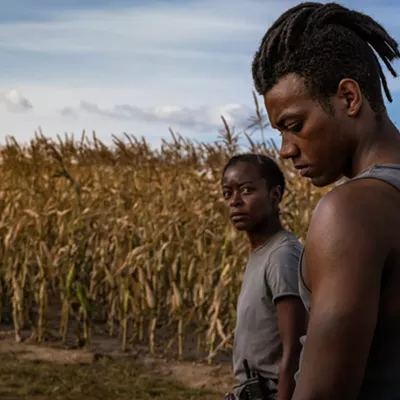It took me three different attempts to slog through the Rubicon pilot. Perhaps this speaks to the ADD-addled attention spans of America’s youth. Perhaps it means I’ve flooded my mind with so much overstimulation that I can no longer concentrate. Or maybe it means that Rubicon is just that boring.
You wouldn’t expect it would be. It’s about a brilliant young man uncovering a conspiracy controlling our government. The first episode begins with a suicide and ends with a major character dying in the sort of “accident” that comes coated in quotation marks.
But conspiracy stories are inherently absurd — especially ones relying on numerology and secret crossword messages. They need goofy energy and explosive power to propel the suspension of disbelief.
Rubicon, however, intentionally refuses to use any of the sexy gimmicks of cinematography or pacing or dialogue tricks of a Flash Forward or a Prison Break. No flashy “enhance … enhance … enhance” satellite imagery, and no complicated sonar-listening devices. The think tank run by conspiracy theorist Will Travers (James Badge Dale) is populated with bleary-eyed government types, the sort who chew on pencils, sift through filing cabinets and bring sack lunches. Their hair is mostly dull, their bellies mostly prominent. Plots spend more time meandering through their domestic lives than focusing on high-octane international intrigue. These are gutsy choices, perhaps, but not entertaining ones.
Mad Men’s slick and swanky ‘60s set design and Breaking Bad’s odd-angled cinematography and brilliant Arizona landscapes all allow us to enjoy simply marinating inside their worlds, even when the plots themselves are slow to start cooking. Rubicon, on the other hand, is weighed down by an aesthetic that appears to be lit by fluorescent lights borrowed from an under-budgeted high school.
There’s nothing wrong with the individual performances, the dialogue or the characters — but there’s nothing about them worth clinging to, either.
As conspiracy-laden television shows age, the twists and turns, the moles, and the triple-moles usually send the grand scheme morphing from complicated to nonsensical to downright comical. Rubicon may be attempting to combat this by taking a relatively simple plot and streeeeetchiiing it out. But stretch a plot out too far, and your week-to-week viewers will be left starving.
Wake me up when the car chases start.
Rubicon (AMC, Sundays, 9pm)
TIVO-WORTHY
Kids in the Hall: Death Comes to Town
Remember the Kids in the Hall? The Canadian sketch comedy troupe back in the early ‘90s? Well, the Kids in the Hall do. After 15 years of Kids in the Hall being canceled, the troupe is back with a goofy murder mystery populated by all the production value, absurdity, and cross-dressing you’d expect from a sketch comedy group. But now they’re, like, 40 years old. (Fridays, IFC, 10 pm)
Weeds
Isn’t it odd in this post-Breaking Bad era that a pot-selling show like Weeds is still on? We’ve moved on to much harder substances. (Mondays, Showtime, 10 pm)
The Big C
Reactions to a diagnosis of cancer (or any serious disease, really) can involve crying, yelling or oddly uncomfortable jokes. Since Laura Linney (The Truman Show, You Can Count on Me, Kinsey, John Adams) is diagnosed with cancer in a pay-cable television drama, she reacts to the news with bitter one-liners, emotion-packed monologues, and — of course — exploration of the malaise of suburbia. It may all seem a bit crass and insensitive. And indeed, that’s one of The Big C’s greatest strengths. (Mondays, Showtime, 10:30 pm)






















